Plague Journal, Vol. 4
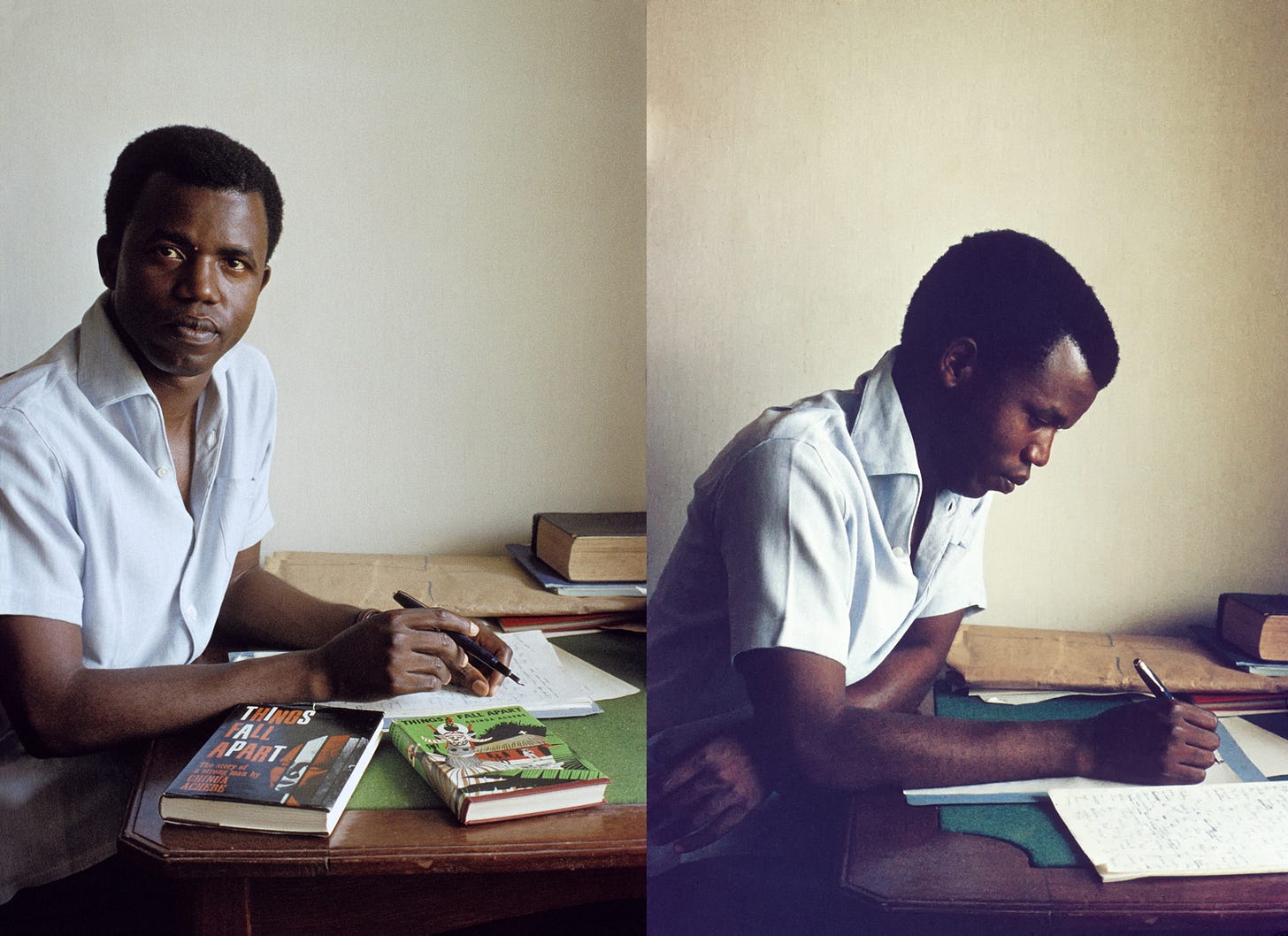
Photo: Chinua Achebe at his house in Enugu, Nigeria, sometime in 1959, which would have been right after the publication of his first novel Things Fall Apart (Eliot Elifoson/National Museum of African Art/Smithsonian Institution)
I realized, only after sending out the last volume of this newsletter, how poorly timed my proud claims about distancing myself from the news were; the truth is, by the time I pressed send, I was once again headline-checking and Twitter-scrolling, because there were, finally, some urgent and necessary things happening in the world. (This is why I’d make a terrible journalist; it takes me a month to compose a simple email, and by the time it’s finished, the world has moved on.)
My poor timing, however, has paid unexpected dividends. I got this great response from my friend and adopted cousin Annie Lynch, who is a comedy writer/performer/embroiderer in Los Angeles. Here is part of what she said:
“It’s good to hear you are examining yourself and your implicit biases during this time. Everything is scary and it’s hard not to feel helpless against it all. I want you to know that as a white man your voice carries more weight in influencing others around you, and though you may be in suburban Canada, your voice still matters in the fight for equal rights. Removing yourself from seeing these things might be needed for mental health, but it’s a privilege that others do not have. This is not the time to look away. Donating, signing petitions, contacting government officials—doing anything for fifteen minutes a day is better than doing nothing.”
The privilege of being able to remove myself from the conversation is absolutely true, and something that, if I’m honest, I already know and probably don’t want to acknowledge. The thing that trips me up is the very public way we live our lives right now: the common practice of social signaling, bandwagon-jumping, sharing every single opinion we have (no matter how nascent or unformed it might be). In a world where wokeness is a status symbol, which acts are genuine and which are performative? Often, we don’t ourselves know.
Imagine if there was a movement on social media where people of European descent—especially those who identify as progressive and liberal—shared stories of their own prejudices instead of the opposite. Signaling one’s lack of wokeness seems far less self-serving.
Annie is totally right, though: the right thing to do is probably the uncomfortable thing to do, and the most uncomfortable thing, for me, is to say something out loud and not worry whether or not people think I’m being opportunistic.
Here’s what she has to say about what she’s seen in Los Angeles over the past month, and how she approaches the morass of digital life:
“I am in LA and have been going to protests and seeing the police brutality, and donating, and calling, and signing—and it still doesn’t feel like I’m doing enough. The helicopters, sirens, and gunshots I hear every day and night are a reminder of what is happening to others around me. To be honest, when it comes to social media, I don’t give a shit about validation—I get angry, now, when people are silent. I may come off as a privileged white person with not enough grasp of the big picture, but I’m going to at least use that privileged platform to inform at least one person a day about a document they should sign, or a place they should donate, or an opportunity to volunteer.”
Here are some resources that Annie herself regularly shares: Ava DuVernay’s documentary The 13th, The Talk, Systemic Racism Explained in 5 Minutes, and A Radical Library.
/////
Here are four interesting things I’ve read lately:
1 — Art Must Engage With Black Vitality, Not Just Black Pain
This piece by Jennifer Baker in Elecrtic Lit has made me realize that a diverse reading list must also include a diverse range of experiences.
“As someone of African descent burgeoning on my own self-awareness, I ask of myself as editor and creator: To what extent am I adding to our pain and our humanity? When I write an abused Black woman or an incarcerated Black teen, am I introducing them with solely pain on the page or am I giving the character an existence someone else can see themselves in?”
2 — Confessions of a Former Bastard Cop
This anonymous piece on Medium is absolutely terrifying, and goes a very long way to explaining everything we’re seeing play out on the streets of American cities right now.
“Armed, indoctrinated (and dare I say, traumatized) cops do not make you safer; community mutual aid networks who can unite other people with the resources they need to stay fed, clothed, and housed make you safer. I really want to hammer this home: every cop in your neighborhood is damaged by their training, emboldened by their immunity, and they have a gun and the ability to take your life with near-impunity. This does not make you safer, even if you’re white.”
3 — Meet the parenting expert who thinks parenting is a terrible invention
This piece by Irene Caselli and Lynn Berger in The Correspondent has made me feel a lot better about how the last few months have played out in our home.
“Instead of thinking of children as underdeveloped adults (and of the elderly as retirees with little added value to society), we need to understand that every stage in the life cycle has its own purpose. In early childhood, that purpose is exploration. And it starts surprisingly early.”
4 — The Ancient Greeks’ Guide to Rejecting Propaganda and Disinformation
This piece by Asha Rangappa and Jennifer Mercieca in Zócalo Public Square is right in my wheelhouse, as it takes what seems like a uniquely contemporary problem and shows how we’ve been struggling with it for a few thousand years.
“As technologically advanced as the fight between Twitter and Trump now seems, this dilemma is not new at all. The world’s very first democracies—in ancient Greece—had their own difficult debates about truth, knowledge, and democracy. If the ancient philosophers were alive today they would say this is no mere scuffle over Tweets, but a moment that asks us to make a fundamental choice about whether we want to live in a society that values the truth.”
/////
Here are three cool people/things from around the Internet:
1 — Jamelle Bouie
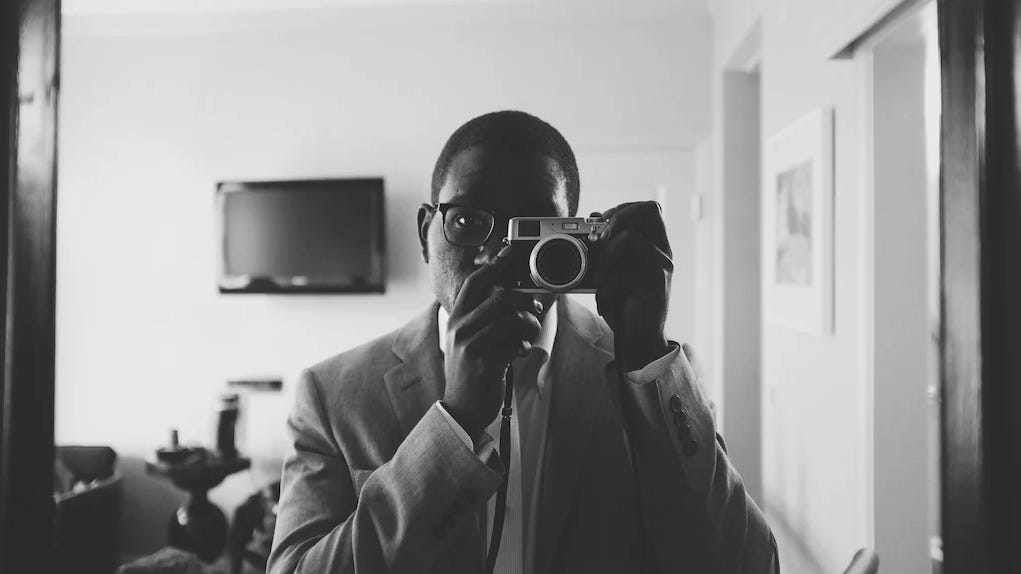
I discovered Jamelle Bouie’s writing when he was working for Slate, and was very excited when he moved to The New York Times, where he has become one of their essential voices. He wrote a great essay about my favourite TV show from last year, guested on one of my favourite movie podcasts, and tweets regularly — and with great critical insight — about comic books, so obviously he’s an idol of mine. I once saw him in real life (at a SXSW breakfast buffet) and have always regretted that I was too shy to approach him and tell him any of this.
Anyways, he has a terrific newsletter, which you should subscribe to, if only for the recipes.
2 — Poolside FM

I don’t want to ruin the surprise for you, but if you like retro chillwave tunes, old computer interfaces, and out-of-context 80s-era VHS footage, you must visit this website immediately. I often have it open on my second monitor while I’m working (even though it constantly distracts me from working).
3 — The Worst Movies of All-Time A-Z
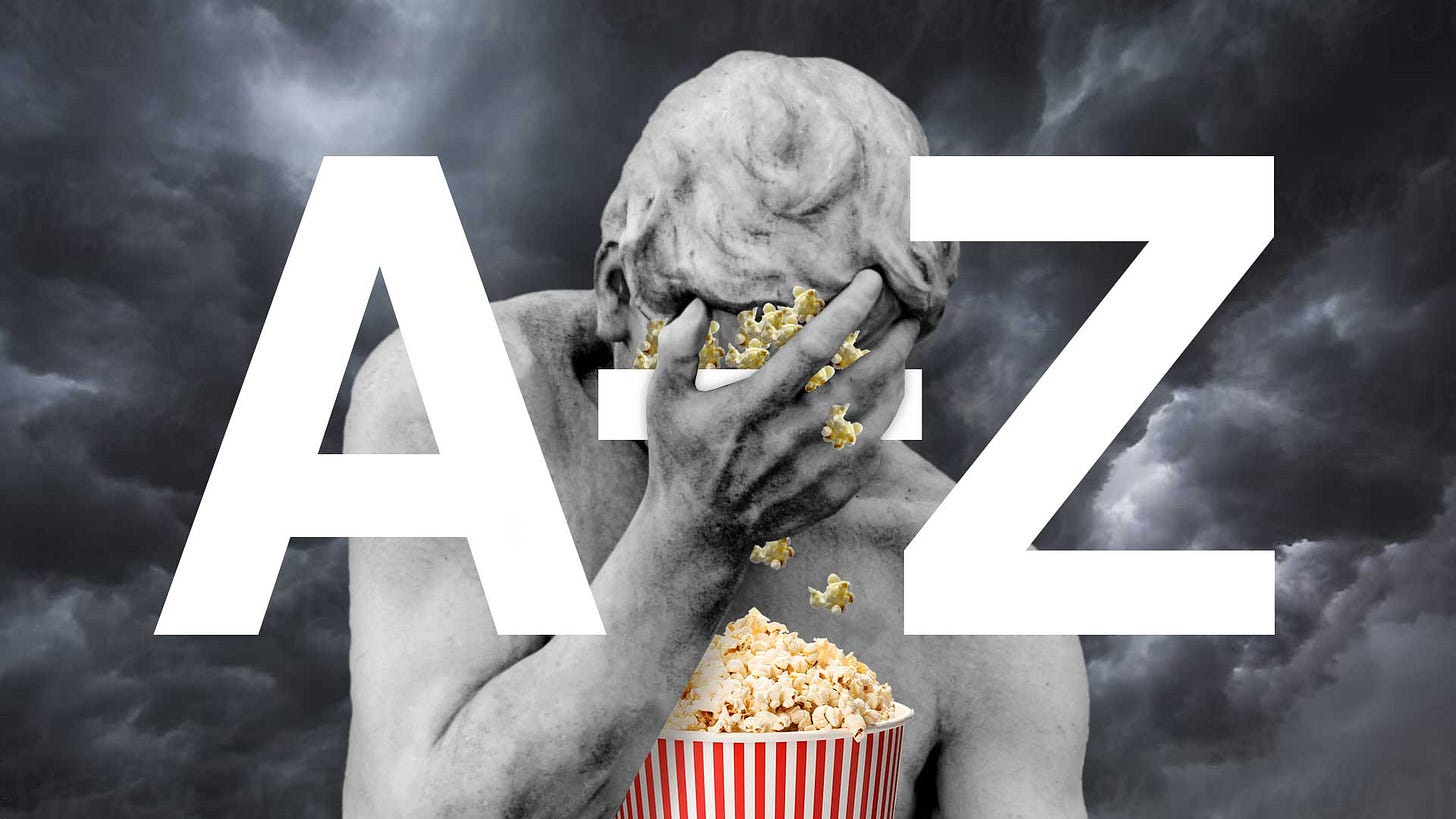
The worst movies of all time: A-Z | Dear Cast & Crew
None
Dear Cast & Crew’s A-Z series is so popular that it has spawned a sequel: The Worst Movies of All-Time A to Z. And, unlike most sequels, this one might be even better than the first. As before, the editing work by Christopher Redmond and Casey Tourangeau is something to behold; if you watch a lot of these pop-culture compilation videos, you’ll pretty quickly recognize that level of craft here is exceptional; anyone who can add nuance and subtext to a transition between Leprechaun in the Hood and Manos: The Hands of Fate is a true artist.
/////
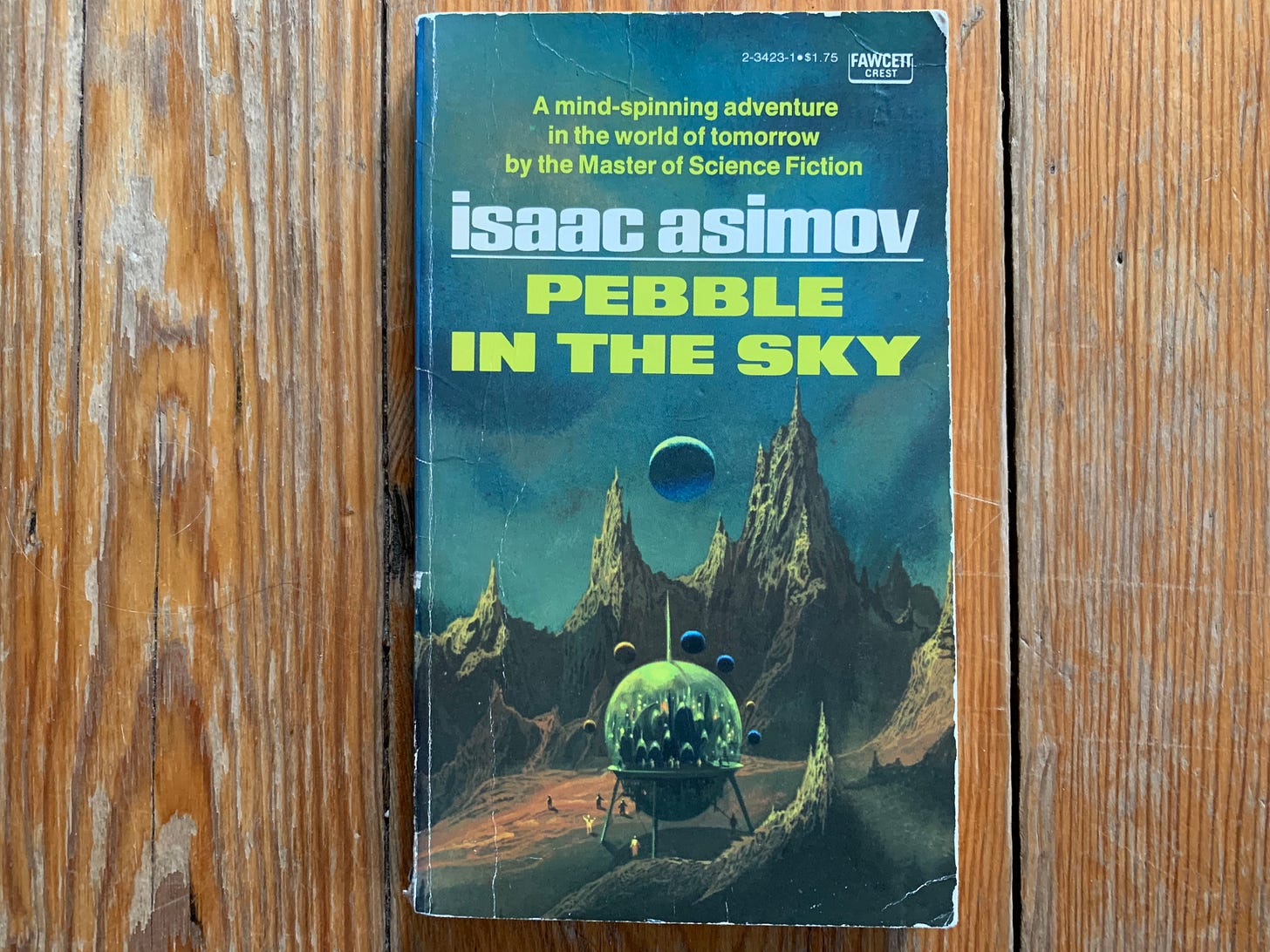
What a surprise to discover, here in June of 2020, after scanning my bookshelf and randomly picking out a beat-up paperback copy of Isaac Asimov’s Pebble In The Sky that I bought for a dollar at a church sale years ago, that it’s all about a hyper-contagious virus that wreaks havoc throughout the universe, and the devastating effects of systemic prejudice against a minority population.
I have a weakness for vintage sci-fi paperbacks, and when I come across them at yard sales or used book stores, I can’t resist (my purchasing decisions are based wholly on cover design and how many exclamation marks are in the jacket copy). I’m always surprised, when I read them, how often they resonate at contemporary frequencies; times change, but human nature and its ancillary institutions never do.
Example: here’s what space-archaeologist Bel Arvadan, hero of Pebble in the Sky, has to say about his prejudices towards earthlings.
“I was born on Baronn in the Sirius Sector. I lived my life in an atmosphere of anti-Terrestrialism in the formative years, so I can’t help what flaws and follies lie at the roots of my subconscious. But look on the surface and tell me if, in my adult years, I have not fought bigotry in myself. Not in others; that would be easy. But in myself, and as hard as I could.”
Fighting it in others would be easy—I vibe with that sentiment. Perhaps that’s the idea I’ve been trying to articulate all along: that to offer support and raise awareness—all those things we do so easily through digital platforms—is only half the battle, and perhaps, for some, a way of evading the fundamental issue: that the problem lies within and not without.
/////
It’s the 45th Anniversary of Jaws, one of the greatest and most rewatchable movies of all time, and I was lucky enough to see it again recently at a makeshift backyard movie theatre on Father’s Day.

You may have been hearing about the film lately for a different reason: the “Mayor From Jaws” has become a meme, and for good reason—the smiling denialist Larry Vaughn, played by Murray Hamilton, spends much of the film convincing the citizens of Amity Island that their shark-plagued beaches must stay open to prevent the local economy from collapsing. Even Carl Gottleib, the movie’s screenwriter, has chimed in on the character’s newfound relevance:
“I think the lesson, the takeaway, and now more than ever, there is going to be an inescapable tension between—and I’m going to call them the oligarchy; the establishment, the monied classes, the one percent—and the rest of us and the rest of humanity.”
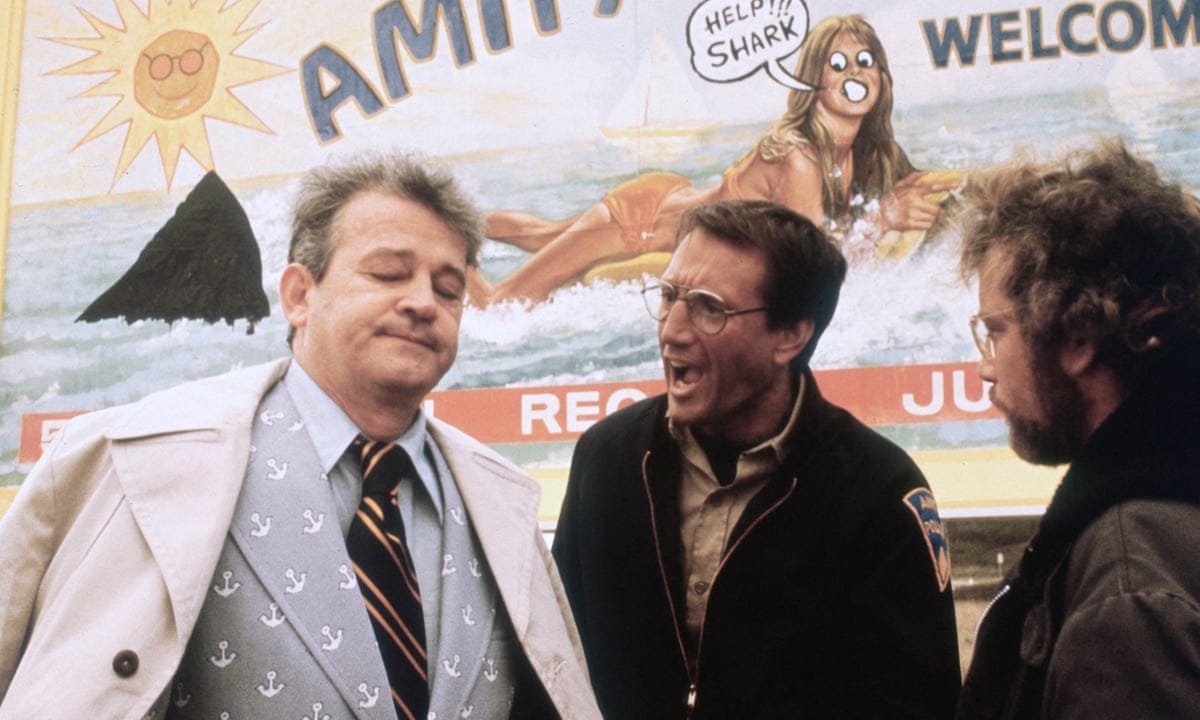
That pandemic parallel is really striking. But in Adam Kempanaar and Josh Larsen’s revisit of the film on a recent episode of Filmspotting, it becomes clear that there’s something else happening in Jaws that is uniquely relevant to what’s going on in the world right now. Specifically, the notion that the film may not, in fact, be a story about a giant mean-eating carcharodon carcharias, but rather the story of a man in a position of privilege and authority who comes to recognize his own culpability and tries to take responsibility for it.
It’s a very cool thing to get a new—and necessary—perspective on something so familiar. Filmspotting is one of the all-time greatest podcasts of any kind, and lately, in the absence of wide-release movies to review and cinematic trends to ponder, they’re doing a lot of fun stuff, like an overview of Christopher Nolan’s entire filmography and a series on the 8 most notable films of 1984. Highly-recommended.
/////
I will leave you, this week, with two surprising facts about the movie Jaws; one of them is disturbing, the other is kind of wonderful—I’ll let you decide which is which.
Boris Johnson, the UK Prime Minister responsible for what many consider a very shoddy mismanagement of that country’s coronavirus response, once proclaimed that “the real hero of Jaws is the mayor.”
Forty-five and twenty-seven years after their respective releases, the top two films at the U.S. box office are Jaws and Jurassic Park.




